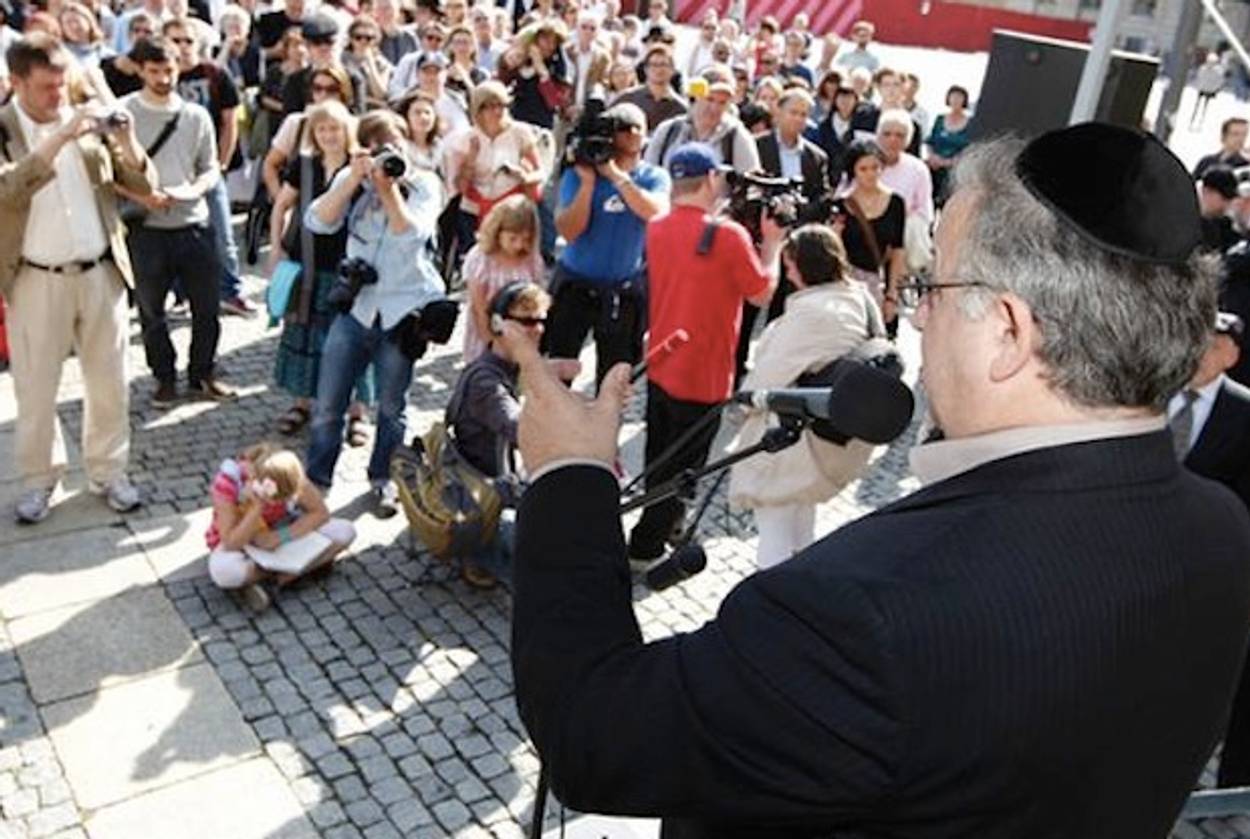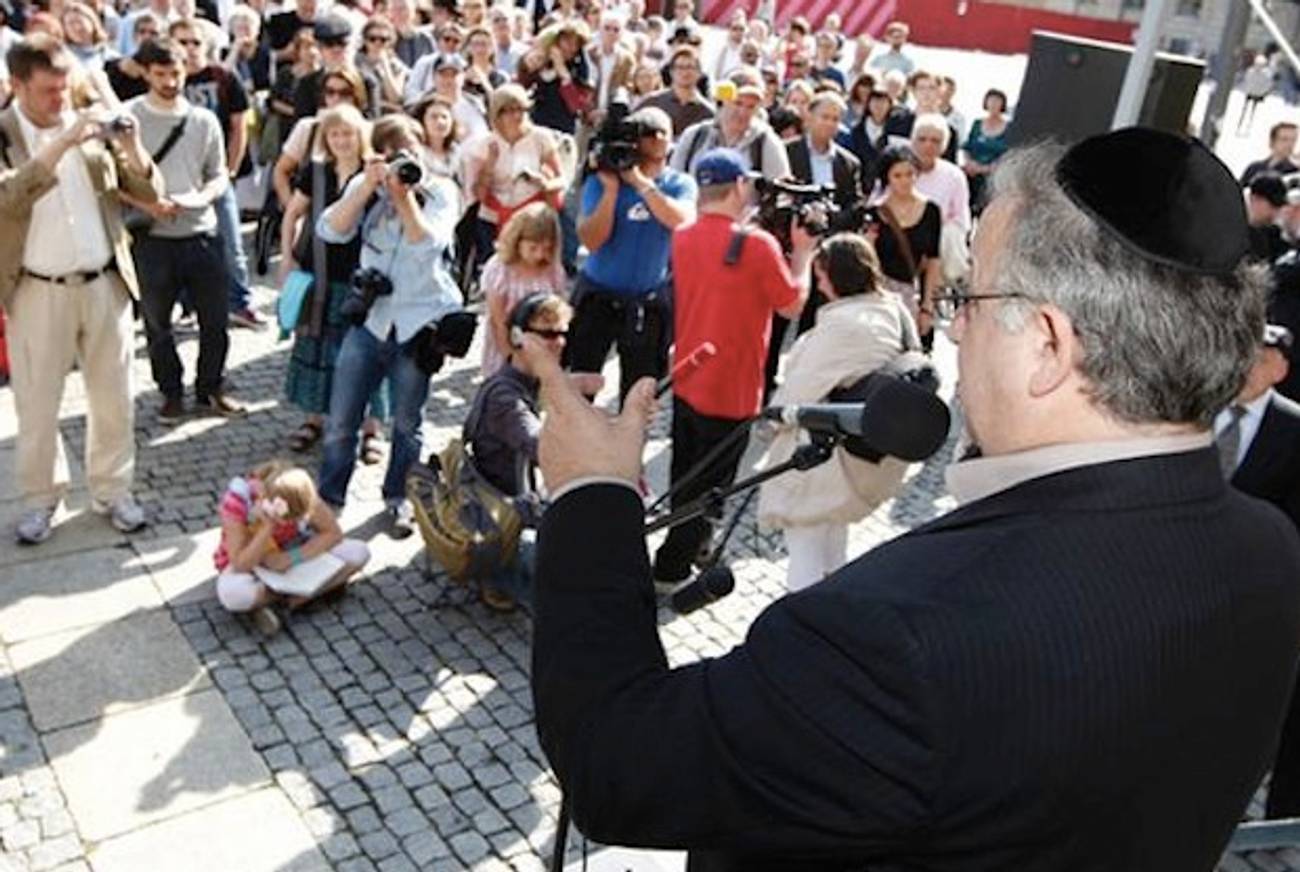Does Germany Still Want the Jews?
Questions are emerging about Germany’s Jewish future




On Saturday at Bebelplatz, the site where thousands of books were torched by the Nazis in 1933 for being “un-German,” roughly 300 German Muslims and Jews gathered to rally against the court ruling in Cologne back in May, which banned non-medical circumcision.
They also were protesting a legal solution offered by the Berlin State Ministry of Justice that would allow ritual circumcisions only by medical practitioners. Jewish and Muslim leaders have vehemently rejected the solution, as have organizations dedicated to child protection. The latter has vowed to fight the ruling to the German Supreme Court if necessary in order to protect the rights of children to remain unharmed.
The rally-goers were buoyed by support from 50 different organizations including the German Protestant Church and the Berlin archbishopric. The former chairwoman of the Jewish community in Berlin spoke as well as the current chairman of the sizable Turkish community.
Despite an event like this or a recent rally following a brutal attack on a rabbi, the German newspaper Der Spiegel devoted some serious space in its Sunday paper to report on the status of the German Jewish community, specifically to ask whether or not Jews see a future for themselves in Germany.
The responses were startling. Take Charlotte Knobloch for example. A mainstay of the community, she served as the chairwoman of the Central Council of Jews in Berlin and wrote a book in defense of her decision to live in Germany. The book won’t be published until October, but in the past few months the tenor of the circumcision debate has seemingly changed her entire outlook on the viability of Jewish life in Germany.
Since late June, when the Cologne regional court ruled that doctors who circumcise a boy for religious reasons can be accused of committing bodily injury, it seems as if everything has changed for her. “I seriously ask if this country still wants us,” she wrote in an editorial for daily Süddeutsche Zeitung last week. In her view, circumcision is an essential ritual of the Jewish faith. She was surprised by how many opponents of the practice spoke out, especially doctors and lawyers. Some simply wanted to prevent children being circumcised, but others seemed to suggest that Jews and Muslims wanted to wantonly mutilate and traumatize their children.
Knobloch wrote that she had defended the continued presence of Jews in Germany for decades, “even though Jews are abused verbally and beaten so badly they need to be hospitalized.” She also said that Jewish religious foundations were being “dragged through the mud” by the debate, which “casts doubt over the future of the already tiny Jewish population in Germany.”
Recent events point to an unmooring of sorts for the Jews of Germany. In addition to the circumcision debate, which Jews see as an attack on a basic tenet of their faith, and the recent assault on Rabbi Daniel Alter (which led the chancellor of the rabbinical seminary in Potsdam to instruct his students not to wear kippot in public), recent revelations surrounding the ham-fisted police response to the 1972 massacre at the Munich Olympics have seemingly made old wounds raw.
Much has converged in recent months. First, there was the 40th anniversary of the massacre of Israeli athletes at the Munich Olympics, an event which once again highlighted the ignorance of Germany’s police officers and politicians. Then there was Günter Grass’ controversial poem about Israel. Some have also been offended by the fact that Judith Butler, a vocal critic of Israel, will be awarded the Adorno Prize this week.
And then there are the repeated attacks on Jews, mostly by right-wing extremists, but also by Muslims. In the first half of 2012, there were 13 violent attacks, 11 of them carried out by neo-Nazis. Although Jews and Jewish establishments in Germany were attacked on only 16 occasions in 2011, compared with 114 in France, this is no cause for celebration.
Earlier: Berliners Don Kippot in Solidarity
40 Years After the Munich Massacre [The Scroll]
Jews Question Their Future in Germany [Der Spiegel]
Hundreds rally for freedom to circumcise [DW]
Seminary Warns Against Wearing Kippot in Public [INN]
Adam Chandler was previously a staff writer at Tablet. His work has appeared in the New York Times, the Wall Street Journal, the Atlantic, Slate, Esquire, New York, and elsewhere. He tweets @allmychandler.